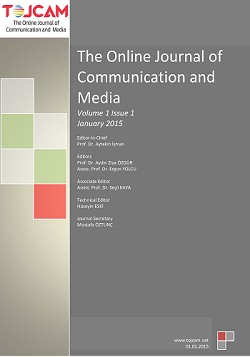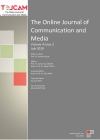TOJCAM - Volume 1 - Issue 1 - January 2015
 CROSS CULTURAL COMMUNICATIONS, PEACE EDUCATION AND DEVELOPMENT IN NIGERIA
CROSS CULTURAL COMMUNICATIONS, PEACE EDUCATION AND DEVELOPMENT IN NIGERIA Umaru A. Pate, Sharafa Dauda
 BRAND LOYALTY ON CONVENIENCE GOODS (CASE OF TEA PRODUCT)
BRAND LOYALTY ON CONVENIENCE GOODS (CASE OF TEA PRODUCT) Reha Saydan, Öznur Koca Parmaksız
Abstract: The companies in the highly competitive market conditions focused on retaining the existing customers and obtaining new loyal customers to be successful. For this reason the factors affecting brand loyalty and the key points about creating and developing loyal customers attracting the attention of marketers. This study determines the factors of brand loyalty preference convenience goods and also examined the impact of these factor on brand loyalty A survey was conducted by face-to-face interviews with 114 housewives. The hypotheses of the study were tested by regression, analyses. The findings indicate that perceived product quality is affecting brand loyalty through brand image and brand satisfaction
 FACEBOOK: LECTURERS’ PERSONALITY, CREDIBILITY AND STUDENTS’ PERFORMANCES
FACEBOOK: LECTURERS’ PERSONALITY, CREDIBILITY AND STUDENTS’ PERFORMANCES Padma Pillai
Abstract: This paper focuses on how social media precisely Facebookis used as a tool of communication between lecturers and students. Personality of lecturerson Social Network Sites (SNS) effects the academic performances of studentshas been researched, but the focus on credibility calls for further exploration. Hence thispaper presents a conceptual framework to examine how the lecturers’personalityon Facebook challenges their credibility among students’ and how it affects the students’ performances. The fundamental of Big Five Personality Theory (B5PT) with Communication Privacy Management theory (CPM) and Social Network Theory (SNT)along with the Theory of Performance (ToP) contribute to the conceptual framework incorporating the role of motivation as a moderating factor.
 HOW CULTURAL DIFFERENCES ARE REFLECTED IN MAGAZINE ADVERTISEMENTS? COMPARISON OF TURKISH, BRITISH AND AMERICAN ADVERTISEMENTS
HOW CULTURAL DIFFERENCES ARE REFLECTED IN MAGAZINE ADVERTISEMENTS? COMPARISON OF TURKISH, BRITISH AND AMERICAN ADVERTISEMENTS Sefa ErbaÅŸ
Abstract: The world economy has been globalizing since at least twenty years ago therefore global market and advertising have been enormous growth. Many marketing/advertising managers and academicians have hot debate which every market is unigue so global advertising contents especially local cultural differences have been considered carefully. Levitt called for this idea is global marketing strategies in 1983. Some researchers favor localized view in which local managers employ advertising appeal, expression, selecting ad agencies which reflect cultural values are persuasiveness than ignorance them while the others view that standardization of international advertising is executed all over the world. This paper examines how places cross-cultural advertising by investigating the differences in advertising expressions in print advertisements from the United States, United Kingdom and Turkey. The research method of content analysis was utilized to analyze chosen countries’s different cultural values orientation in magazine advertisements. Pollay and the other scholars’s cultural values framework have been used for six categories are clustered domestic, imported, joint venture and not clear and also how advertising appeals and expression are differences in terms of using Hofstede’s individualism and collectivism dimension.


